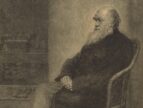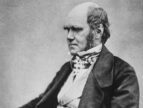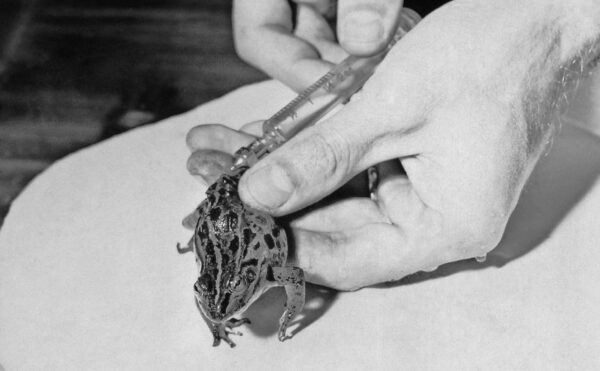Leonard Darwin had a lot to live up to. He was the son of the legendary Charles, and several of his siblings proved to be brilliant scientists as well. But Leonard never quite measured up and muddled along through life as a mediocre military officer and two-bit politician. In his fifties, he pronounced his life a “failure.” But in his sixties, he finally found his calling: the dark pseudoscience of eugenics, a field he embraced in part to prove that he wasn’t the failure he imagined.
About The Disappearing Spoon
Hosted by New York Times best-selling author Sam Kean, The Disappearing Spoon tells little-known stories from our scientific past—from the shocking way the smallpox vaccine was transported around the world to why we don’t have a birth control pill for men. These topsy-turvy science tales, some of which have never made it into history books, are surprisingly powerful and insightful.
Credits
Host: Sam Kean
Senior Producer: Mariel Carr
Producer: Rigoberto Hernandez
Associate Producer: Sarah Kaplan
Audio Engineer: Rowhome Productions
Transcript
One day in 1862, Charles Darwin strolled into his drawing room, saw his son Leonard reading something—and froze in horror.
It wasn’t some smutty magazine, or a radical political tract. No, Leonard was reading Darwin’s own book—On the Origin of Species.
Leonard was 12 years old. Before this age, he’d been educated at home, and he had largely been shielded from the controversies surrounding his father’s book. Controversies about whether the book promoted atheism, or reduced human beings to mere brutes. Then, Leonard had enrolled in school for the first time. Other students had been whispering about him, about his father’s radical book. Leonard naturally got curious, and he grabbed the book on his next visit home.
It was a heartrending moment for Charles. You try to shelter your children from your own actions. But he couldn’t protect little Leonard forever.
Still, rather than despair, the naturalist drew himself up. He said, “I bet you half a crown that you do not get to the end of that book.”
Challenge accepted. Leonard dove back in. But as he later admitted, his father won the bet. Leonard never finished Origin.
It wasn’t just that the book was beyond a 12-year-old. The book was beyond Leonard, period, even as an adult. By his own account, he simply wasn’t as bright as the other Darwin children. He came from one of the most illustrious families in England—and he was the dullest knife in the drawer.
That status ate at Leonard—he never felt good enough. And it determined the course of his life. Although he never finished Origin, he strove to extend his father’s legacy. Unfortunately, rather than do so scientifically, his insecurities pushed him down another path—into the dark world of eugenics.
Charles Darwin and his wife Emma Wedgwood had 10 children, seven of whom reached adulthood. Three were elected fellows of the prestigious Royal Society scientific club and three were knighted—an honor not even Charles received. Another, a banker, ran the Darwin-Wedgwood family business, including the famous pottery concern. Another became the celebrated editor of her father’s works.
Then there was Leonard.
He was born in 1850, the eighth child overall. The family nicknamed him “pouter” for his puffy cheeks and sullen expression. Half the time he was tearing about the family estate, raising hell. Charles once scolded him for climbing a tree in his Sunday best. The other half of the time Leonard was sick in bed—a bout of scarlet fever nearly killed him at age 12.
In fact, that bout of sickness prevented Darwin from attending a world fair near London—a conference attended by none other than Gregor Mendel, the pioneering geneticist.
Just think! These two titans of science might have met there, might have discussed their research. Except Leonard was sick and Darwin had to stay home. Leonard kicked himself for the rest of his life. He once wrote, “If I prevented my father from meeting Mendel, do you not think that I … ought to be hung, drawn, and quartered?” Clearly he was joking somewhat, but the recrimination was always there.
As a teenager, Leonard took up photography. But he showed little aptitude in school—unlike his siblings. In particular, he lacked critical thinking skills. He tended to believe whatever you told him all too readily—especially if you gussied up your claims with some quasi-scientific language. That flaw would come back to bite him.
To everyone’s surprise, especially his father’s, Leonard scored quite well on an aptitude test in his teens and won a spot at the Royal Military Academy. There, he studied engineering. But he hardly proved an outstanding officer.
While stationed in Malta once, he had to march a team of soldiers through a narrow passage. He turned a corner and found an angry snorting bull there. Rather than face this challenge head-on, or devise a workaround, Leonard wilted. To the disgust of his men, he feebly ordered them to about-face and double-time-it the other direction. He showed no determination, no fight.
These were still the days when pedigree and a famous name meant as much to military advancement as actual skill. But even with the glittering name of Darwin, it took Leonard twenty years to rise to the rank of major, where he stalled out.
At age 32, he married a woman named Elizabeth. To their disappointment, they had no children, so Leonard devoted himself to other pursuits instead. One was photography.
He ended up snapping an iconic picture of Charles—the bearded old man, slumped in a wicker chair. Leonard also pioneered the use of photography in books, including in his father’s works.
He also traveled to the Caribbean to document a solar eclipse, and then to New Zealand and Australia to capture transits of Venus across the sun—although both the transits were clouded over, to his disappointment. As he later commented, “Few people … have been twice round the world to see a thing without seeing it.”
Based on these and other travels, Leonard was named an officer and later president of the Royal Geographical Society—even though, as he admitted, he knew nothing about geography. Other society members just wanted a Darwin involved. In fact, he detected some subtle mockery when an explorer named a miserable, mostly ice-covered mountain range after him.
In 1892, Leonard entered politics and ran for Parliament. Despite his famous name, he won the election mostly because his wife proved an incredible canvasser, winning the backing of key players and drumming up support far and wide. Even then, Leonard won by just four votes.
He used to rehearse his speeches aloud on empty train cars to London, marching up and down, barking out his points. But it didn’t help much. Even his own mother declared him an underwhelming speaker, lacking in eloquence.
When Leonard ran for reelection in 1895, he lost to a local brewer by thirty votes. A subsequent investigation revealed that the brewer had cheated, and he got the boot. So Leonard ran again against a new opponent—and lost even worse this time. His career in politics was over.
Meanwhile, his brothers were making fortunes and winning knighthoods. Leonard had long been self-deprecating about his abilities, calling himself “muddleheaded” and “stupid.” Again, perhaps he was just making jokes at his own expense. But it’s hard to see anything funny in his declaration, in his mid-50s, that his life was, quote, “more or less a failure.”
Then, at age 61, at the depth of his despair, Leonard discovered eugenics.
Eugenics was known as the “science of better breeding.” It had two goals. One was to encourage so-called “desirable” people to have more children. Second, it wanted to discourage so-called “undesirable” people from having any children. Sometimes by forcibly sterilizing them.
The field of eugenics was actually founded by Charles Darwin’s cousin, Francis Galton. Charles mostly kept his distance, feeling that Galton was on shaky ground. But Leonard ate it up. In fact, he considered eugenics the logical extension of his father’s work. Charles had outlined the conditions for the survival of the fittest. So Leonard thought, why not encourage the thriving of the fittest?
The sticking point, of course, is defining what “better” and “fitter” meant. And you probably won’t be shocked to know that upper-class blokes like Leonard tended to define “fit” as being a rich WASP like him. Anyone who didn’t conform to that ideal was considered unfit.
Leonard became president of the British Eugenics Society in 1911. He then oversaw the first world congress for eugenics the next year. He finally felt in his element—that he was bringing honor to the Darwin name.
Leonard always portrayed himself as a moderate among the eugenicists because the eugenicists included some true fanatics in their ranks. But from a modern perspective, that’s hard to swallow.
For instance, Leonard said he had no intention of controlling who married whom. He would simply forbid certain people from having children within marriage. That hardly seems moderate!
Furthermore, while some people advocated for widespread sterilizations, Leonard said he wasn’t draconian about the matter. He was simply keeping an “open mind” about whether to round people up and destroy body parts against their will. How noble, to keep an open mind.
But really, even his supposedly moderate stand was bogus. Behind the scenes, he said that eugenicists merely needed to appear moderate to avoid scaring the masses off and losing support.
Leonard also proved cynical about education. According to some eugenicists, education was a waste of time. People were born brilliant or born stupid due to genetics, and education therefore made no difference.
Leonard disagreed. He always said that education would bring about a better future. But in public, he never explained what he really meant. When he talked about educating people, he meant educating them about eugenics. He argued that once people understood eugenics, the unfit would see the supposed logic and voluntarily stop reproducing, or even sterilize themselves.
If Leonard really believed that would happen, no wonder he failed in politics.
The writer H.L. Mencken once said that, “For every complex problem, there is an answer that is clear, simple—and wrong.”
I think about that quote when I think about Leonard Darwin. As mentioned above, one major problem with eugenics is defining who the supposedly fit and unfit people are.
But Leonard had a simple answer to this: the superior ones were those who made a lot of money. He was willing to give some people bonus points for pedigree or professional achievement. But overall, in his own words: “A man who can earn and keep money shows that he has the qualities essential to survival” and should therefore reproduce.
A niece overheard him say this once and was appalled. She asked: What about artists or philosophers?, people not driven by money. Leonard scoffed. He thought her objections were sentimental nonsense.
But his niece wasn’t alone in attacking Leonard. Once, Leonard sneered in public that it seemed silly to give college scholarships to poor people, who clearly lacked the genetic endowment to take advantage of this opportunity.
Upon hearing this, Lancelot Hogben—the scientist from last week’s episode who pioneered the frog pregnancy test—got furious.
If you’ll recall, a scholarship to Cambridge rescued Hogben from poverty, and he proved a brilliant biologist. So he challenged Leonard Darwin, saying that under a eugenic regime, he would have been left to rot. Leonard could only bristle his mustache and stew. He had no comeback.
Hogben and other prominent scientists criticized eugenics on other grounds, as well. They argued that racism and xenophobia motivated the designations about who was fit and who wasn’t. They also exposed the sloppy statistical work that much of eugenics was based on.
Hogben especially annoyed Darwin for his criticisms of statistician Ronald Fisher. You might remember Fisher from the very first episode of this podcast. He lost a bet about whether a colleague could tell whether milk or tea was added first to her cups of tea. It’s a charming story that led to a revolution in experimental design and statistical analysis.
For all his brilliance though, Fisher fell under the spell of eugenics, and became fast friends with Leonard Darwin. Despite a forty-year age difference, they exchanged letters steadily for twenty years. Leonard also suggested eugenics topics for Fisher to write about and analyze mathematically, since Leonard knew he didn’t have the smarts.
But Lancelot Hogben wasn’t intimidated by Fisher’s brilliance. He tore Fisher’s eugenics work apart, pointing out the many flaws. Perhaps most importantly, Hogben and others pointed out that the traits eugenicists most wanted to promote were traits that are all but impossible to quantify: intelligence, memory, morality, motivation, creativity. If you can’t even measure such traits, how will you know whether the next generation exhibits more of them?
Criticisms like this royally pissed off Leonard. Publicly, he remained aloof, but he fumed in private. He once talked about socking Hogben in the eye for a negative review of Fisher’s work.
Unfortunately, these weren’t just academic disputes. The eugenics movement that Leonard Darwin supported and promoted soon inspired laws in the United States that led to the sterilization of thousands of people. Nazi Germany then used those laws as justification for their genocidal campaigns against Jews and others.
There’s one other irony to note as well—about Leonard’s own genes.
You see, Charles Darwin’s wife Emma was also his first cousin. This wasn’t uncommon: around 10 percent of upper-class English marriages then were between cousins. But you’d think that Darwin of all people would know better.
Now, it’s impossible to know for sure the consequences of this cousin marriage. But three of the ten children born to Charles and Emma died in childhood. To be sure, child mortality was higher back then. But even mild inbreeding does make children more prone to infections and more likely to die.
Inbreeding can also reduce the ability of offspring to have children of their own. And, Leonard never did have children with his wife Elizabeth.
Eventually, Elizabeth passed away. And at age 50, Leonard remarried a 32-year-old woman, eyeing another chance at having a family.
Alas, any inbreeding problems just got compounded with this union, given that the woman was again his cousin. Perhaps unsurprisingly, they could not have children together, either. How ironic, that an arch-eugenicist—a man who thought himself among the fittest of the fit—never reproduced.
Once, as a young man, Leonard asked his father whether it was possible to suddenly develop into a genius in middle age. Charles’s answer isn’t recorded, but even the asking of this question is sad. Leonard dedicated the last years of his life to supposedly improving the stock of humankind. But all the while he must have wondered whether his own stock wasn’t defective to begin with.
Indeed, perhaps that’s why he pursued eugenics with such enthusiasm—the hope that, despite his failings in the military and politics, that his genes and his bank account would overcome his mediocrity and prove him worthy of his father’s name.
In his old age, someone asked Leonard once about the education of children. You might expect a eugenicist to scoff at the notion and emphasize the importance of genes alone. But Leonard said something surprising. With an intensity that startled his conversation partner, he responded that all that matters is that you love children. You have to, quote, “provide them with enduring affection.”
Had Leonard Darwin died before age 60, he would probably seem like a decent guy today. But eugenics changed him—either warping his beliefs, or bringing out something ugly that was hidden inside him. He certainly wasn’t the raving fanatic that other eugenicists were. But in some ways, that’s the saddest bit of all. That even a dull, well-meaning fellow from a good family can be seduced so easily into evil.







